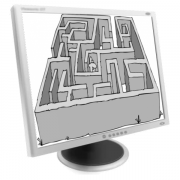![]()
Devaluation - The Slippery Slope
Borderline devaluation destroys relationships and perpetuates the cycle of self-abuse and self-hatred that are often present in the borderline experience. This devaluation is a slippery-slope.
Borderline Personality Disorder has at its root distorted cognitive interpretations. Since most borderlines did not have their needs met in the developmental years there is a propensity toward negative perception. This negative perception is aroused and or triggered by any number of things that take borderlines emotionally back to the unmet needs and the pain that sits there until faced, felt and healed.
One very central way to change this cycle of being triggered and then sliding (often subsconsiously) into cognitive distortions which that can lead to acting out and over-all child-like behaviour, demanding, push/pull, self-harm, feelings of rejection or abandonment to name just a few is to learn how to recognize and stop borderline devalution.
Devaluation is the lessening of someone or something. It often results from triggered-distorted thinking. It often takes the shape of negative, judgmental, critical and angry conclusions drawn in relation to someone in the here and now that has come to represent someone in one's past. It is yet another facet or extension of borderline-narcissism.
When one begins this cycle of devaluation there is great reason for concern. It is a slippery slope from the mental exercise of devaluation to behavioural reality of aggression or passive-agression. When one is devaluing another person who that person is gets blurred. It then gets easier to value one's own narcissistic and selfish expression which will over-ride the reality of the other person's entity.
In the act of devaluing borderline's often misinterpret reality as if events that have occurred are a conspiracy against them or are happening just to them and being done by others on purpose. This is a prime example of narcissism in action.
An example of devaluation:
You are with a friend who has helped you out a lot and who you believe cares about you. You like this person most of the time. Though there are those times when you think that they think (projection) that you are "less than". Your friend decides to change his/her mind about something that they had promised to do with you. Rather than just accept that at face value and accept his/her reason you suspect that it has more to do with you. You suspect and come to believe that they are doing something to you on purpose to hurt you. Chances are that the change in plans your friend has made has nothing at all to do with you. Here is the critical area in which you need to stop the cycle of devaluation before it starts.
If you get into devaluation it will begin with the thought that your friend is not being honest with you. It will proceed to your believing they really don't like you anyway. Then the next thought would be that they don't care about you so why should you care about them. Anger sets in as you feel hurt but don't deal with that. Next thing you know, this friend that you wanted to go to a movie with now seems like some stranger you've never known. The reason has nothing to do with him/her. The reason that your friend now seems like a stranger is because you have projected so much of yourself on to him/her that you are not seeing them anymore. So, in essence then, this devaluation of another person, is really an extension of your own self-hatred and how undeserving you feel. And all it takes to activate this trigger in the average borderline is a slight change of plan or routine that leaves anything in the borderline's experience feeling unpredictable or out of control.
It is when you devalue, and react to others as an extension of yourself (narcissistically), that the slippery slope sees you sliding down the triggered-reality toward what is tantamount to illusion and distorted thoughts. Any action that you act on that results from that illusion or those distorted thoughts has a great chance of being very damaging in any relationship. It will be experienced as controlling, manipulating and or punishing by the person on the other end of your devaluation of them. If you are unaware of the effect that you are having on others and if you are unable to take personal responsibility for the unfolding of this devaluing dynamic the chances are good then that you will feel rejected, and or abandoned, not understand why and then escalate your negative and controlling behaviour/defence mechanisms which will then only further alienate others from you.
Devaluation of others is a slippery-slope because it quickly leads to patterned responses from your past crowding into your relationships in the present. When you come to understand what devaluing others costs you, you may then decide that it is a cycle worth stopping. When you start your slide down that slippery slope it can be difficult to stop yourself before you have done a lot of damage to yourself and others and before you end up at the bottom of that cycle yet again.
No deserves to be devalued. When one is able to devalue another it dehumanizes them and leads to an inability to respect. This is often the precursor to violence.
There are thought-patterns which occur in patterned ways in each and every devaluing episode. The key thing is to learn what they are and how to recognize them. The way to stop them is to work through them and understand what they are attached to from your past. The best way to not fall into the pattern of devaluation is to remind yourself that everything is NOT about you. If you find yourself about to devalue someone just tell yourself to STOP. Just saying STOP can help you re-focus your thoughts elsewhere.
© Ms. A.J. Mahari - January 31, 2001

















